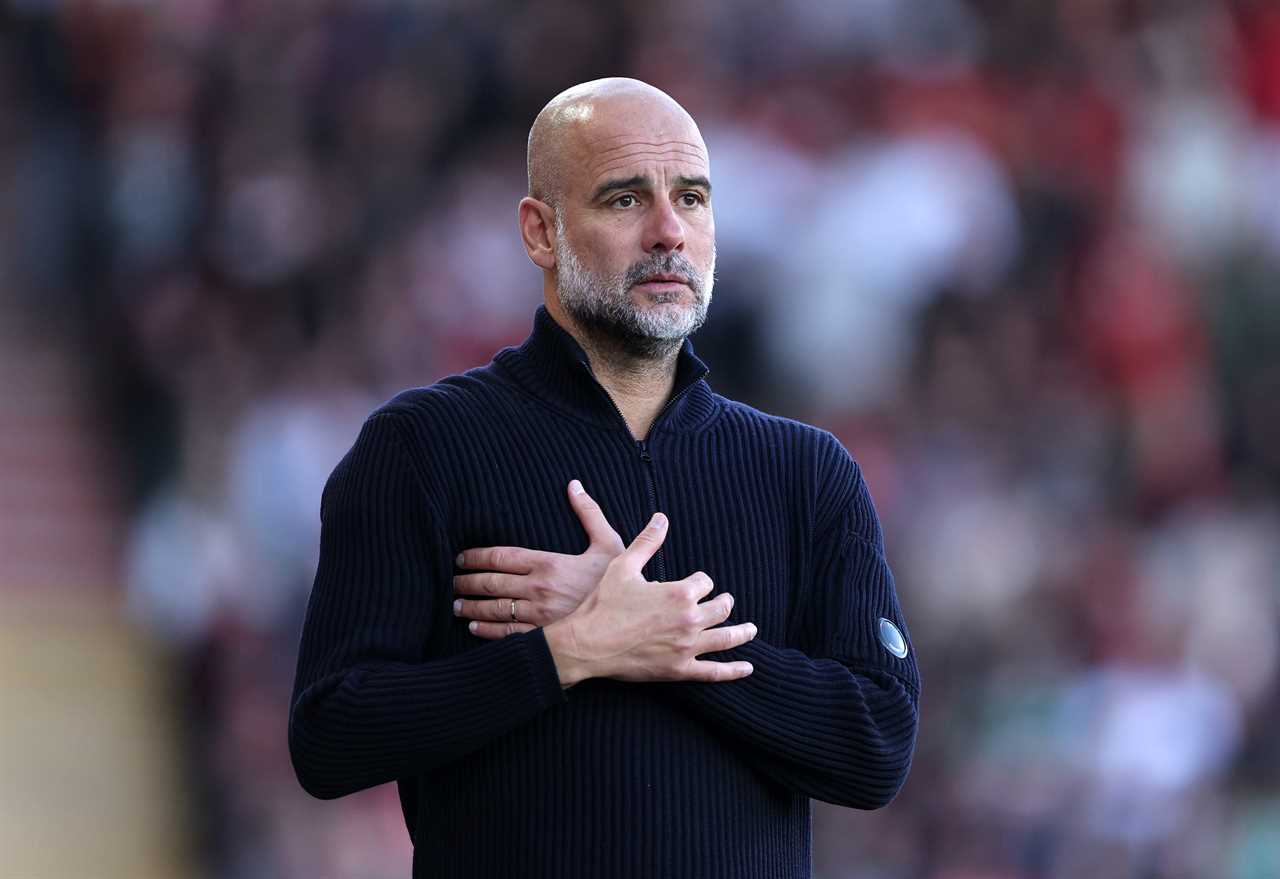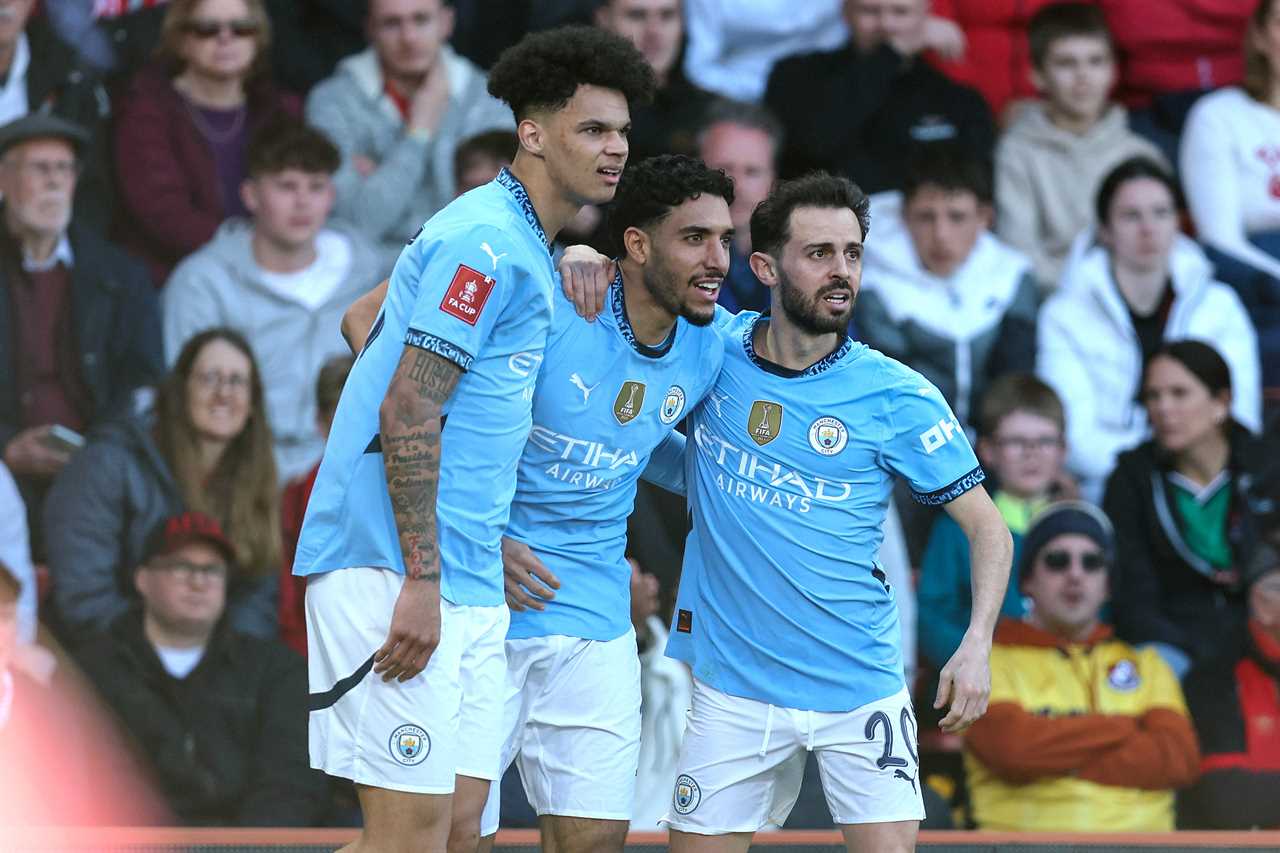
A Dramatic Comeback Secures Wembley Spot
Manchester City showcased their resilience by overturning a goal deficit to triumph 2-1 over Bournemouth, ensuring their place in the FA Cup semi-finals. The victory not only highlights City’s determination but also underscores Pep Guardiola’s ability to inspire his team in crucial moments. Goals from Erling Haaland and Omar Marmoush were pivotal, sealing another opportunity for the club to vie for silverware at the iconic Wembley Stadium.
Strategic Formation Shift Disorients Opponents
At half-time, Guardiola made a decisive formation change, moving to a midfield diamond that effectively dismantled Bournemouth’s pressing tactics. This adjustment allowed City to gain better control of the midfield, facilitating smoother ball circulation and creating more scoring opportunities. The new setup disrupted Bournemouth’s rhythm, providing Manchester City with the upper hand in dictating the pace and flow of the game.
O’Reilly’s Versatile Role Strengthens Defense and Attack
Nico O’Reilly was deployed in an unconventional role as left-back, a bold move by Guardiola that paid off handsomely. By positioning O’Reilly on the left, Guardiola not only accommodated disciplinary issues with Khusanov but also optimized the defensive lineup. This switch allowed Ruben Dias to occupy his natural right-back position, while Gvardiol shifted to left center-back. O’Reilly’s forward runs injected creativity into the attack, reducing his defensive burdens and transforming the team’s shape into a dynamic 3-4-2-1 formation.
Marmoush’s Intelligent Run Delivers Decisive Goal
Omar Marmoush emerged as a standout performer, with his intelligent movement culminating in a crucial goal. Receiving a high-quality pass from O’Reilly, Marmoush made a surprising backward run that created significant space behind Bournemouth’s defense. The defenders were left uncertain about whom to mark, allowing Marmoush to exploit the gap and finish with precision. His ability to navigate tight spaces and make impactful runs around the edge of the box proved vital in securing the win for City.

Nunes’ Defensive Lapses Open Bournemouth’s Goal
Despite the overall team success, Matheus Nunes had moments of concern. Playing out of his usual midfield role, Nunes made a poor pass that was intercepted by Bournemouth, leading to their only goal. His lack of defensive solidity highlighted the challenges of adapting to the altered formation. While Guardiola’s tactical adjustments were largely effective, Nunes’ performance suggests that further refinement may be necessary to fully integrate him into his new position.
Haaland and Ederson: Overcoming the Press
Erling Haaland continued to be a formidable presence up front, while Ederson’s distribution was instrumental in breaking down Bournemouth’s defensive lines. The goalkeeper’s precise long passes allowed Haaland to find space and capitalize on scoring opportunities. Guardiola’s instructions for Haaland to drift wide and create angles for Ederson added another layer of tactical depth, ensuring that City remained a constant threat despite Bournemouth’s pressing efforts.
Looking Ahead to Wembley
With this victory, Manchester City advances confidently to the FA Cup semi-finals, setting up an exciting showdown at Wembley. Guardiola’s innovative tactics and the players’ ability to adapt under pressure were key to the win, demonstrating the team’s championship pedigree. As City prepares for the next challenge, fans can look forward to another display of tactical intelligence and high-quality football, hoping to see their side lift the coveted FA Cup trophy once more.
Frequently Asked Questions
What is the best defensive strategy against a powerful offensive team?
Defending against a strong offensive team requires a disciplined and strategic approach. A disciplined marking system and an organized defensive line are key tactics. Limiting the scoring chances of opposing players by forcing them to the sidelines instead of the middle can be done. A quick switch from attack to defense after losing possession and effective communication between defenders are essential. The offensive team can use counter-attacking tactics to exploit any gaps created by the defensive team's commitment.
What are the essential skills needed to play great football?
To be a good football player, you need to develop technical, tactical and physical skills. Technical skills include dribbling the ball, shooting, and passing. Tactical awareness includes knowledge of the game including movement, positioning and decision-making. For performance, physical attributes such as endurance, speed and strength are essential. Finaly, mental toughness and focus are crucial to maintaining performance through a match.
What are some strategies I can use to keep motivated and focused while improving my football abilities?
Setting clear and attainable goals, and keeping track of your progress is essential to staying motivated and focused. Regularly reviewing your performances in both training and matches will help you identify areas that can be improved and also strengths which should be enhanced. Finding a partner to train with or joining a team of players can encourage perseverance by creating supportive relationships. Additionally, maintaining a positive mindset and visualizing success can be powerful motivational tools. Incorporating diversity in practice routines, allowing sufficient recovery and rest time and keeping practices interesting are important strategies for maintaining motivation and focus.
What is the best physical conditioning for a footballer?
A football player's conditioning program should be well-rounded, focusing on all aspects. Included in this are aerobic exercises that improve endurance, sprint training to improve speed, agility and power, as well as flexibility routines for injury prevention and recovery. Additionally, sport-specific drills that simulate match conditions are beneficial in preparing the body for the physical demands of football. Working with a certified fitness professional or coach can help tailor the program to an individual's needs.
What role plays a coach in a successful football team?
A football coach's role is crucial to the team's overall success. He does this by developing training plans, strategic planning and player management. Coaches are responsible for creating effective training sessions, developing strategic game plans and motivating their players to do their best. Coaches make important decisions about player placement and selection, while also managing team dynamics to maintain a positive environment. Their leadership often helps teams overcome challenges and drive them to achieve success.
Statistics
- Goalkeepers who engage in specialized reaction-time training reduce their goals-conceded tally by an average of 25% over a season.
- A consistent mental focus regimen, including visualization techniques, can enhance player concentration levels by up to 20% during matches.
- Teams that prioritize teamwork in training sessions increase their passing accuracy by an average of 15% in competitive matches.
- Defensive units that practice coordinated drills together at least twice a week concede 18% fewer goals in match play.
- Football players who follow a structured fitness regimen can see up to a 7% increase in their on-field speed and agility benchmarks.
External Links
How To
How to develop a winning mind-set in football
A winning mindset begins with clear, attainable football goals and a positivity attitude. Visualization techniques, where you imagine yourself succeeding in various game situations, can be incredibly powerful. Challenge yourself consistently in training, and use feedback to improve your skills. Cultivating resilience is key. Instead of being discouraged, learn from your failures and setbacks. Surround yourself with people who encourage you to grow and uphold high standards both on and off the field.
 CricketBoxingFormula 1GolfHorse RacingPremier LeagueTennisPrivacy PolicyTerms And Conditions
CricketBoxingFormula 1GolfHorse RacingPremier LeagueTennisPrivacy PolicyTerms And Conditions
